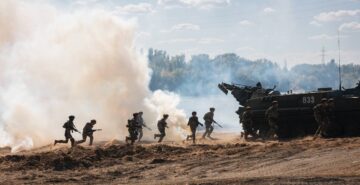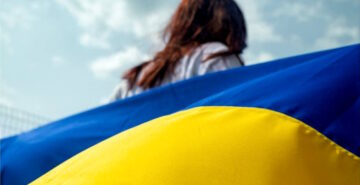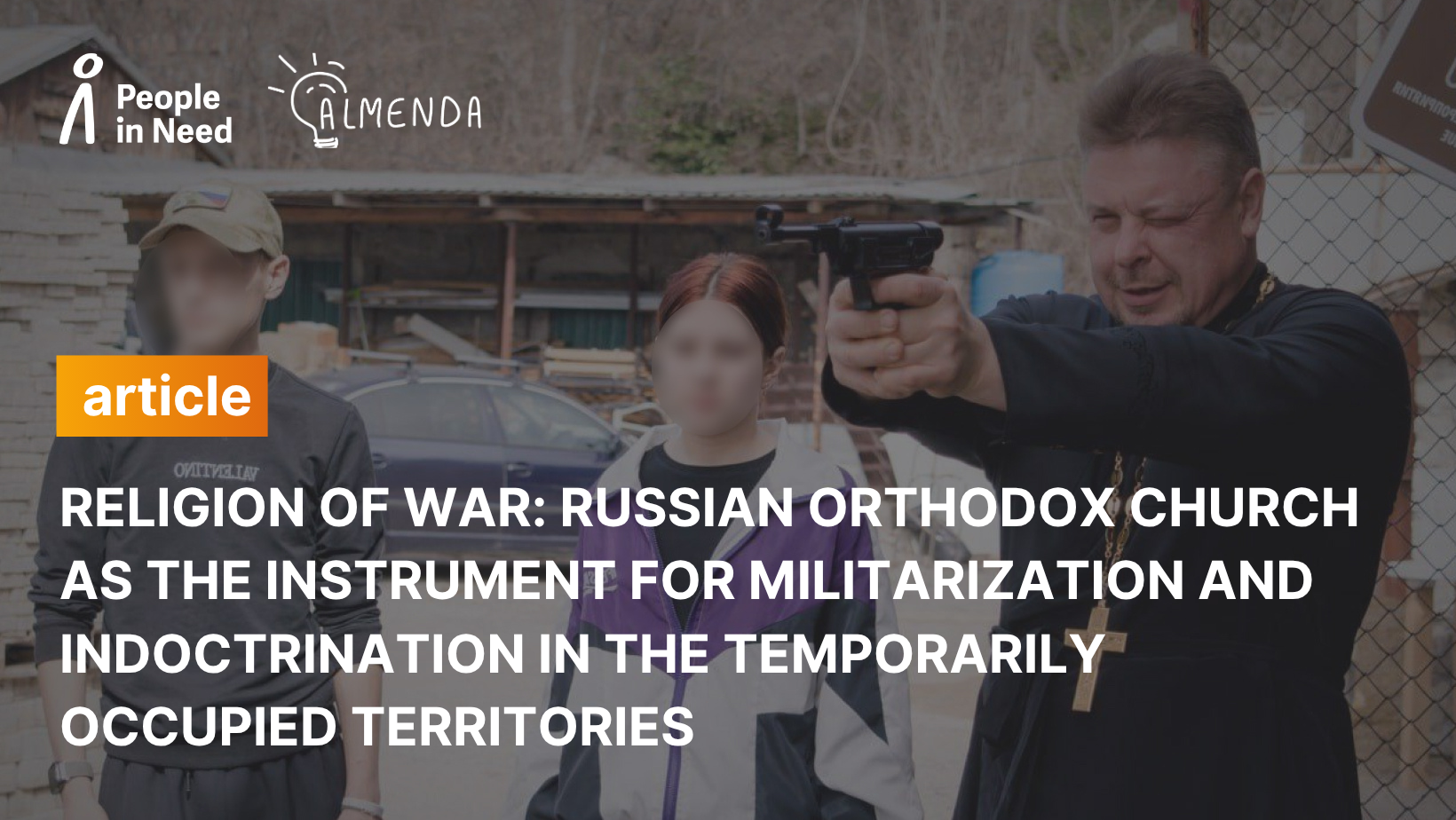

Religion of War: Russian Orthodox Church as the Instrument for Militarization and Indoctrination in the Temporarily Occupied Territories
Russia still has not come to terms with the loss of control over the former republics after the collapse of the Soviet Union. The Kremlin consistently seeks to restore influence in the post-Soviet space by using a wide arsenal of means – from diplomatic and information pressure to armed aggression. The ideology of the so-called “Russian World” (Russian – “Русский мир”) – a concept that justifies foreign political intervention under the pretext of protecting the “united Russian civilisation” has become one of the key instruments of the aggressive policy of the Russian Federation.
Initially conceived as a cultural project to support the Russian-speaking population abroad, “Russian world” quickly turned into a doctrine of foreign political intervention. The idea was formed in the intellectual circles of Russia, in particular among members of the Moscow Methodological Circle, and since the early 2000s, it has been adapted to the state policy. In 2006, the President of the Russian Federation, Vladimir Putin, declared: «The Russian world can and should unite all those who value the Russian language and Russian culture, no matter where they live – in Russia or abroad. These are the words you should use more often- “Russian World”». In 2008, the term “Russian World” was officially included in the Foreign Politics Concept of the Russian Federation, and later – in its updated version dated 2023. It was the “protection of the Russian world” that became the official justification for Russia’s foreign political aggression, in particular the occupation of the Autonomous Republic of Crimea and the parts of Donetsk and Luhansk regions in 2014 and the full-scale invasion of Ukraine in 2022.
The concept of the “Russian world” is based on the thesis of the “triunity” of Russians, Ukrainians, and Belarusians as parts of a united “Russian people.” The central element of this ideology is Orthodoxy, in the specific, imperialistic interpretation of the Russian Orthodox church (hereinafter referred to as the ROC), which performs not only a spiritual but also an openly political and ideological function. The ROC has become one of the main broadcasters of the Kremlin’snarratives in the temporarily occupied territories of Ukraine (hereinafter referred to as the TOT), actively supporting the occupation administrations, justifying war, and involving children in patriotic and military education and propaganda.
Historical aspect and legal basis
The ideological cooperation between the Kremlin and the ROC is nothing new. The Russian Orthodox Church has been closely cooperating with the state for centuries, since the times of the Moscow Tsardom and the Russian Empire. An example of such cooperation was the introduction of the Holy Governing Synod (also known as the Most Holy Synod, established by Tsar Peter I in 1721) – a state body that subordinated the church hierarchy to imperial authority and definitively secured the subordination of the ROC to the secular ruler. During the Soviet times, religious structures were subordinate to the state and were used for the legitimisation of its decisions. In modern Russia, a similar model is observed – contrary to Article 14 of the Constitution of the Russian Federation on the separation of religious associations from the state, the ROC de facto functions as the “state church” that not only gives its blessings but also actively supports the policy of aggression. During the wars in Chechnya and Afghanistan, priests took part in the moral support of the military,[2] and in some cases – directly in combat operations, however, in the modern war against Ukraine, the role of the ROC is significantly broader – from the ideological indoctrination of the population, and to the participation in the propagandistic campaigns the and militarization of children, in particular in the TOT.
The ROC exercises a targeted ideological, spiritual, and patriotic influence on children and youth through educational programs, educational initiatives and cooperation with local administrations and educational institutions. This corresponds to the official ideology of the “Russian world,” as explicitly stated in the documents of the World Russian People’s Council (hereinafter referred to as WRPC), headed by Patriarch Kirill. In the patriarch’s report at the XXV WRPC, it is emphasised that the “Russian world” is not an ethnic, but a civilizational category based on the Orthodox tradition and loyalty to the Russian state. According to the Primate of the Russian Orthodox Church, it is Russia that has the “mission” to be the center of spiritual and cultural unity of all peoples that accept its system of values.
According to the WRPC Order “Present and Future of the Russian world” (Russian – «Настоящее и будущее Русского мира») dated March 24, 2024, addressed to the legislative and executive authorities of Russia:
- the war against Ukraine is called “holy,” and Russia and its people “defend the single spiritual space of the Holy Rus,” it is stated that “after its end, the entire territory of Ukraine must enter the zone of Russia’s exclusive influence.”
- the need for “sovereignization of the education system” and cleansing of the educational process from destructive ideological concepts and doctrines, primarily Western, which are alien to the Russian people and destructive for the Russian society” is directly indicated, instead it is recommended to implement a “socio-humanitarian paradigm” based on Russian civilizational identity and traditional Russian spiritual and moral values. The basis for this should be the Decree of the President of the Russian Federation No. 809 dated November 9, 2022 “On the adoption of the Principles of State Policy for the Preservation and Strengthening of Traditional Russian Spiritual and Moral Values”, which, among the traditional values, defines the following: patriotism, service to the Fatherland and responsibility for its fate, the priority of the spiritual over the material, historical memory and continuity of generations, the unity of the peoples of Russia.
The expansion of the influence
The implementation of the policy of ideological influence through education is systematically being introduced in all temporarily occupied territories of Ukraine. In particular, at the elementary school level the “Fundamentals of Religious Cultures and Secular Ethics” (Russian – Основы религиозных культур и светской этики) has been introduced as the mandatory course for students of 4th grades. Its introduction has been carried out in close coordination between local structures of the ROC and representatives of the occupation administrations, in particular the so-called ministries of education. Back in 2016, Lazar, Metropolitan of Simferopol and Crimea, publicly emphasized on the importance of creating a system of cooperation between clergy, pedagogists, and representatives of the occupation authorities in order to ensure the “influence on the younger generation”. These principles became the foundation for the further integration of the church ideology into the educational process.
In the photo: The so-called Head of the Republic of Crimea, Sergei Aksyonov, and Metropolitan Lazar of Simferopol and Crimea at the opening of the Crimean Regional Christmas Educational Readings “Crimea. Lessons of the Century: 1917–2017.” Source: https://glava.rk.gov.ru/articles/ea4bd936-e108-4ac5-9ff0-60000f502947, archive https://archive.ph/lko2X
Formally, according to the statements of the Russian officials, parents have the right to choose one of the modules from the course “Fundamentals of Religious Cultures and Secular Ethics” – for example, either secular ethics or fundamentals of a particular religion. However, in practice, the choice is fictitious. According to media reports and social network posts, school administrations are mandating the study of the “Fundamentals of Orthodox Culture” module. Typically, the representatives of the ROC personally hold the presentations of the course at parent meetings.
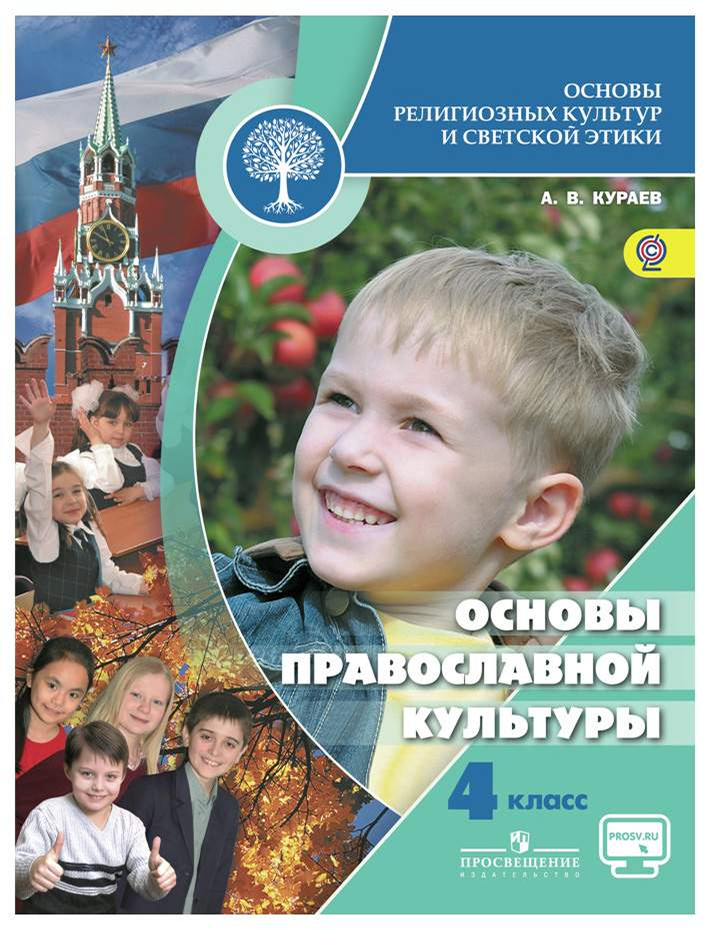

The content of the course “Fundamentals of Orthodox Culture” contains clearly defined ideological doctrines. Among the topics are: “Russia – our Homeland”, “Love and Respect for the Fatherland”, and “Patriotism of the Multinational and Multireligious People of Russia”. The course is aimed at shaping children’s understanding of Russia’s civic identity, a sense of connection to the “Russian nation”, pride for Russia as their own “historical Fatherland”, and the devaluation of any alternatives, in particular Ukrainian national identity. As a result of the lessons, children should “feel a sense of pride for their Homeland” (i.e., Russia).
In addition, starting from 2025, a new subject will be introduced in schools in the temporarily occupied territories – “Family Studies” (Russian – Семьеведение), which will be taught as part of the “Conversations about the important” course. According to the official reports, this subject should contribute to solving “demographic problems in the Russian Federation”. Representatives of the ROC, who promote traditional religious views about the “proper family”, the roles of women and men, as well as instilling obedience and loyalty to the state in children, are involved in teaching this subject.
On the occupied Crimean Peninsula, an additional regional component was introduced – the course “Fundamentals of the Orthodox Culture of Crimea” (Russian – «Основы православной культуры Крыма»), which covers grades 1 to 11. This course is a part of a broader policy of the ideological integration into the Russian cultural and historical space.
Despite being declared voluntary, the study of the aforementioned subjects is, in fact, mandatory. They play a key role in shaping loyalty to the occupying authorities and also contribute to the imposition of Russian narratives about patriotism, obedience, and service to the state.
Forms of propaganda work of the ROC
In addition to being integrated into the formal education system, representatives of the Russian Orthodox Church actively use extracurricular instruments to influence children’s minds. For this purpose, the Synodal Department on Youth Affairs was created within the structure of the ROC, under the supervision of which operate: the All-Church Orthodox Youth Movement (Russian – Всецерковное православное молодежное движение) and the Brotherhood of Orthodox Scouts (Russian – Братство Православных Следопытов), which aim their activities at “shaping patriotic attitude towards the Fatherland (namely Russia) increasing the prestige of military service”.
The Brotherhood of Orthodox Scouts is an official children’s branch of the youth movement within the framework of the Moscow Patriarchate, which declares its goal to form a worldview in the younger generation based on “love for God, the Fatherland (i.e., Russia) and one’s neighbor.”
The branches of this brotherhood actively operate in the temporarily occupied territories of the Autonomous Republic of Crimea, the city of Sevastopol, Donetsk and Luhansk regions, as well as the Zaporizhzhia region. The motto of the Orthodox Scouts is “Be ready! Always ready for God and Russia” (Russian – “Будь готов! Всегда готов за Бога и Россию!”) – vividly illustrates the focus of the organization’s activities, which, in fact, carries out the tasks of russifying children, displacing Ukrainian identity, and preparing young people for service in the structures of the Russian Federation.
A telling example is the event that was held in January 2025: at the initiative of the Crimean regional branch of Saint Luke of Crimea Brigade, members of the Melitopol branch of the Brotherhood of Orthodox Scouts were taken to the temporarily occupied territory of Crimea to participate in the winter gathering “Cadet Corps”. The program of the event included religious rituals (a prayer service), participants’ introduction, as well as training in first aid, basics of field engineering (fortification) and overcoming obstacles.
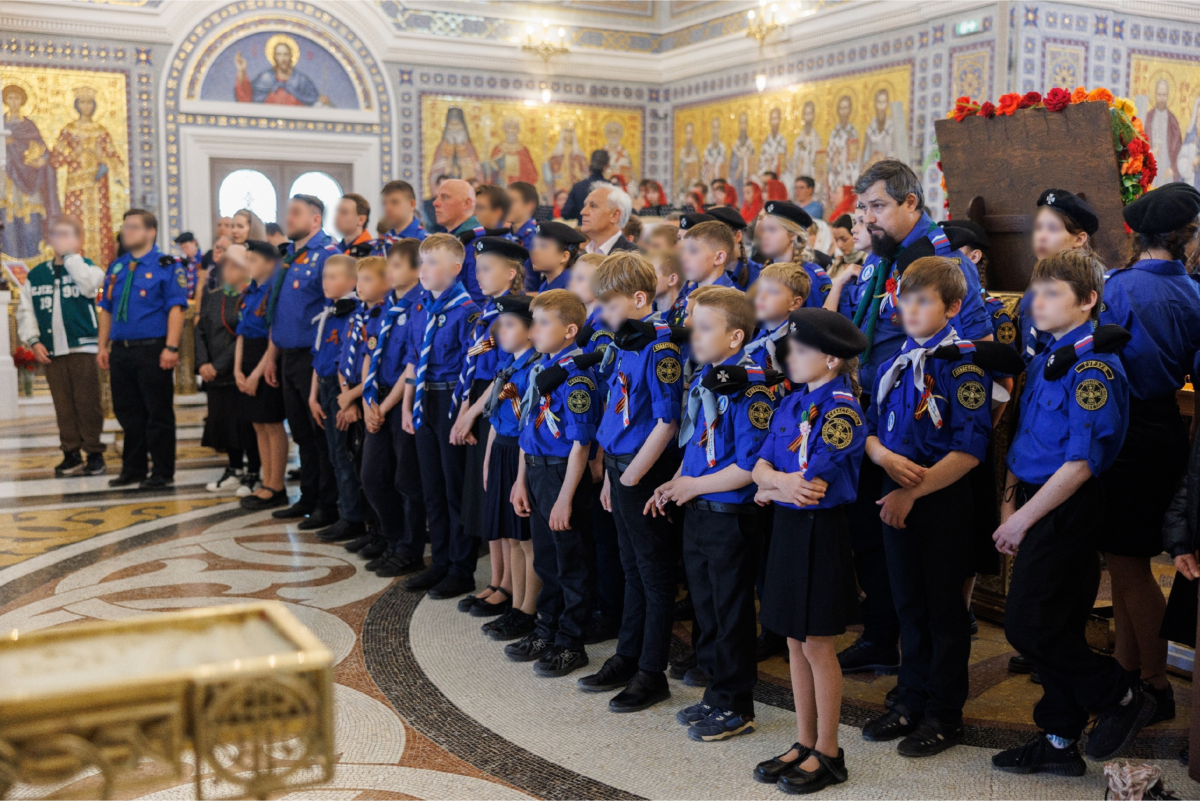

In May 2025, under the slogan of “readiness for God and Russia”, the Crimean regional branch of the Brotherhood organised the St. George Parade titled “Children of the Victors”, in which 250 children took part.
In addition, for systematic ideological work with older youth aged from 14 to 35, in the temporarily occupied cities of Simferopol and Sevastopol, Orthodox youth centers “Tochka Opory” (“Point of Support”) have been opened. The initiative to establish these centers came from the Tikhon, Metropolitan of Simferopol and Crimea. Similar centers are also planned to open in other cities of the temporarily occupied Crimea, including Yalta and Feodosiia.




(Un)hidden militarization
In addition to propaganda under the guise of spiritual education, the ROC openly supports armed aggression against Ukraine, promotes the idea of serving in the Armed Forces of the Russian Federation, and also systematically involves children and youth, including from the TOT, in events in support of the Russian military. The coordination of these actions within the structure of the ROC is carried out by the Synodal Department for Interaction with the Armed Forces and Law Enforcement Agencies. The representatives of this department took part in the III International Anti-Fascist Congress “For Unity of All Anti-Fascism Forces and For Complete Victory over Nazism!”, which was held within the framework of the International Military-Technical Forum “Army”. As part of the event, issues of combating fascism, extremism, and nationalism were discussed (note: in the Russian Federation, the ideologies of extremism and nationalism are equated with the pro-Ukrainian positions).
The ROC systematically organises campaigns in support of Russian Servicemen, involving minors from the TOT:
- Yalta Deanery (the temporarily occupied city of Yalta) with the involvement of an underaged boy, delivered another vehicle to the zone of the so-called Special Military Operation.
- For children attending Sunday School at the Church of the Resurrection of Christ the Savior (the temporarily occupied city of Yalta), at the initiative of the church community, servicemen of the “Bars-Crimea” volunteer detachment conducted a master class on disassembling and assembling the Kalashnikov assault rifle.


- Pupils of the Sunday school at the Church of Saint Barbara (temporarily occupied village Dobro, Simferopol Raion) were involved in weaving camouflage nets for participants of the so-called Special Military Operation.
- For pupils of the Sunday school at the church of Saint John Chrysostom (temporarily occupied city of Yalta), representatives of the “Combat Brotherhood – South” and the Union of Veterans of the so-called Special Military Operation conducted the “Lesson of Courage.” During the event, servicemen demonstrated military equipment to the children, taught them first aid, dressed them in bulletproof vests and helmets, and the children participated in photo sessions with servicemen of the Russian Federation.
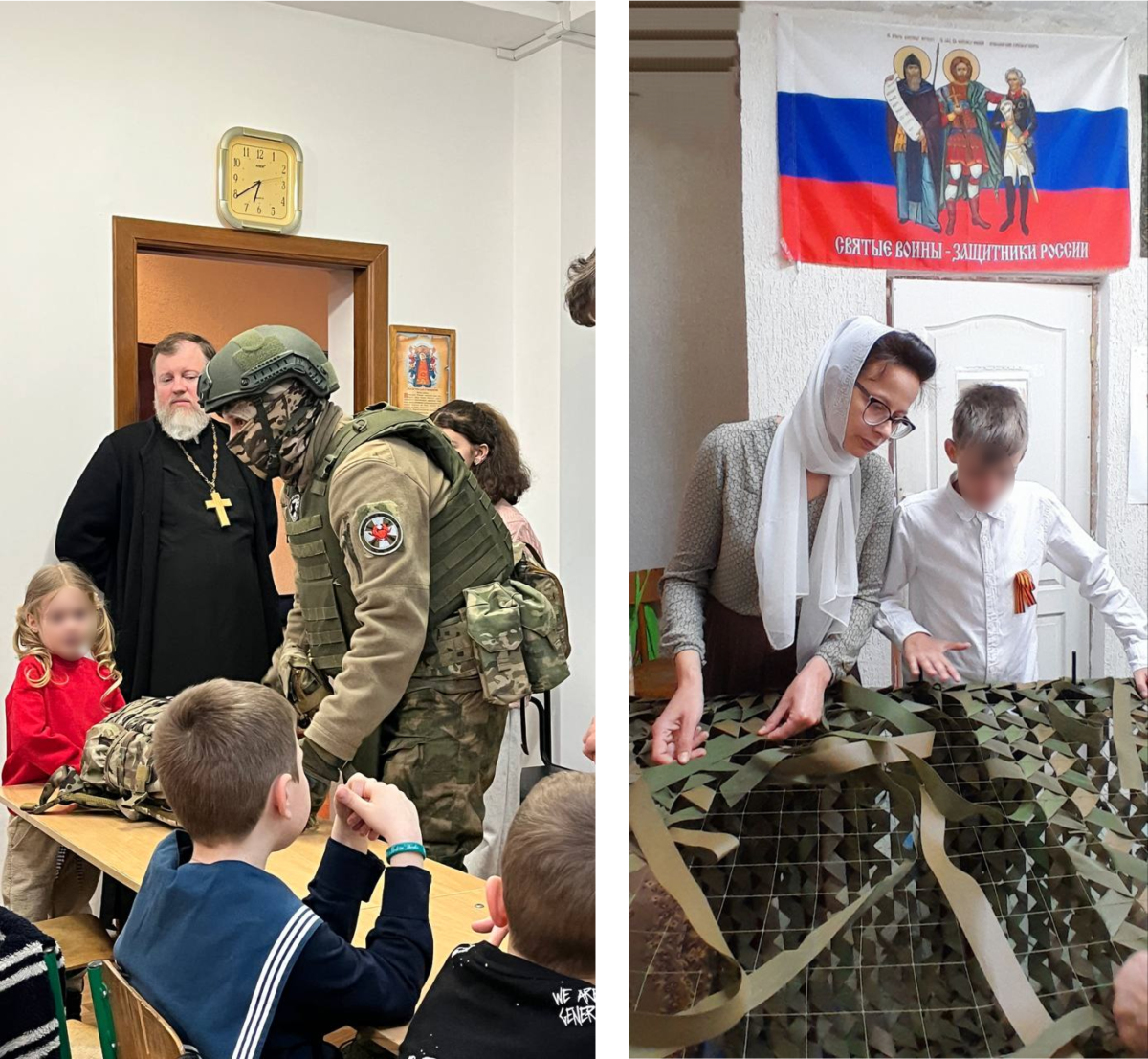

- Often, during military-themed events for children, priests themselves often take up arms. For example, the rector of the Holy Intercession Church in Simeiz, Archpriest Evgeniy Khalabuzar, took part in a master class on shooting and assembling/disassembling the AK-47 rifle at the Simeiz community club together with children.
- During another event, the same priest of the ROC, while assembling a rifle, emphasised to children the need to “love and be devoted to their Fatherland and God.”
- Also, representatives of the Archangel Sunday school (temporarily occupied village Oreanda) held a meeting with students of 6th grades of Yalta Secondary School-Lyceum No. 9 as part of the course “Conversations about the important”. Students were indoctrinated with narratives about a “future victory over modern Nazism” (note: this refers to Russia’s victory in the war against Ukraine).
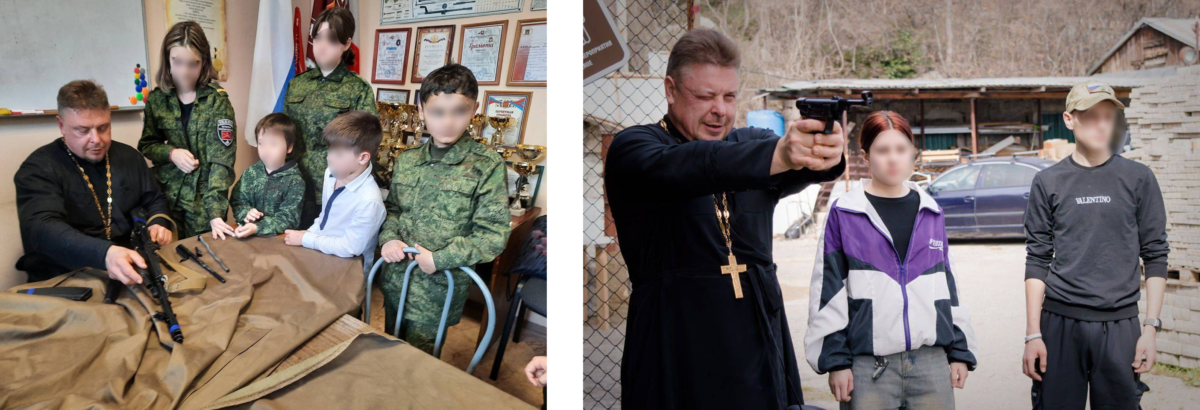

The practice of militarisation and propaganda education by the ROC covers not only the TOT of Crimea, but also other occupied territories. For example, in the TOT of the Luhansk region, an interfaith forum “Religion and Peace” was held with the participation of representatives of the ROC from the occupied Donetsk region. The event aimed at developing new approaches to influence children and youth in order to impose Russian cultural and patriotic identity on them. In the temporarily occupied territory of the Zaporizhzhia region, in the city of Berdiansk, one of the educational institutions has been brought under the authority of the Russian Orthodox Church. Since 2023, the local school No. 5 has been transformed by the local authorities into the “Orthodox Gymnasium”, where in the 2023-2024 school year, 11 children (1-4 grades) were enrolled, and in the 2024-2025 school year, the number of students increased to 40. Funding for the institution is provided by the regional budget and the diocese. During their studies, children are subjected to “spiritual-moral and patriotic education”, as well as “Christian values”. At the event held at this Orthodox Gymnasium commemorating May 9th, ideological statements supporting the war and manipulating Orthodox values were heard: “there is no greater honor than sacrificing yourself”, and teachers expressed the hope that “children will carry on the legacy of our grandfathers and great-grandfathers”.
In conclusion, the activities of the Russian Orthodox Church in the temporarily occupied territories of Ukraine extend far beyond the spiritual realm and become an integral part of the state policy of the Russian Federation aimed at imposing the ideology of the “Russian world.” Through educational programs, youth movements and involvement in the militarization of minors, the ROC plays a key role in shaping a pro-Russian identity, legitimizing the war, and supporting the occupation administrations. Such practices flagrantly violate International Humanitarian Law and the Convention on the Rights of the Child. Therefore, the systematic use of religion as an instrument for ideological aggression, particularly targeting children, must become a subject of international investigation, and those involved in the propaganda of war and the militarization of children should be held accountable.
This article was prepared with the financial support of the Czech organisation People in Need, as part of the SOS Ukraine initiative. The contents of the publication do not necessarily reflect their position.


